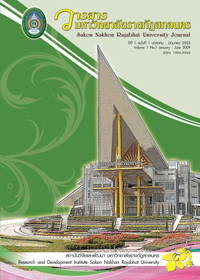คนรุ่นใหม่กับการจัดการท้องถิ่นอย่างยั่งยืน
Abstract
บทคัดย่อ
การวิจัยเรื่องคนรุ่นใหม่กับการพัฒนาอย่างยั่งยืนครั้งนี้มีวัตถุประสงค์เพื่อศึกษาเงื่อนไขปัจจัยที่มีผลทำให้คนรุ่นใหม่สามารถอยู่ในชุมชนท้องถิ่น และวิเคราะห์แนวทางและองค์ประกอบของเงื่อนไขปัจจัยที่ทำให้คนรุ่นใหม่จัดการและอยู่กับชุมชนท้องถิ่นอย่างยั่งยืน การวิจัยครั้งนี้ใช้การวิจัยเชิงคุณภาพจากการสัมภาษณ์แบบเจาะลึก (In-depth Interview) การสังเกตอย่างมีส่วนร่วม (Participant Observation) และใช้กระบวนการเรียนรู้โดยชุมชนเอง จากการลงพื้นที่ภาคสนาม และการจัดเวทีประชาคมผ่านการจัดการเรียนรู้ร่วมกัน โดยกลุ่มประชากร คือ คนรุ่นใหม่ที่อยู่ในชุมชนเครือข่ายอินแปง และใช้การวิเคราะห์เชิงพรรณนา
ผลการศึกษาพบว่า เงื่อนไขปัจจัยที่มีผลให้คนรุ่นใหม่สามารถอยู่กับชุมชนท้องถิ่นได้ ประกอบด้วย เงื่อนไขปัจจัย ดังนี้
1. เงื่อนไขปัจจัยระดับเป้าหมาย ประกอบด้วย การมีอยู่มีกิน สิ่งแวดล้อมสมดุล การมีรายได้ และ การมีชุมชนเข้มแข็ง
2. เงื่อนไขปัจจัยระดับกระบวนการ ประกอบด้วย การช่วยเหลือซึ่งกันและกันของคนรุ่นใหม่ ผู้นำเครือข่ายอินแปง และบุคคลภายนอกที่เกี่ยวข้อง การจัดการความรู้ การจัดการเชิงยุทธศาสตร์ และการจัดการทรัพยากร
3. เงื่อนไขปัจจัยระดับปัจจัยนำเข้า ประกอบด้วย
3.1 ระดับบุคคล คือ พฤติกรรมส่วนบุคคลชอบอิสระ มีความอดทน และเสียสละ มีฐานความรู้ดั้งเดิมและการเรียนรู้เพิ่มเติม การวางแผนการจัดการชีวิต การมีอุดมการณ์ความเชื่อที่มั่นคง การมีช่องทางการสร้างรายได้ และมีการพึ่งตนเอง
3.2 ระดับครอบครัว คือ สภาพเงื่อนไขทางครอบครัว พฤติกรรมของพ่อแม่ และถิ่นที่อยู่ของครอบครัว
3.3 ระดับชุมชนและเครือข่าย คือ การได้รับกำลังใจ การให้กำลังใจกัน การได้รับความช่วยเหลือ การพึ่งพาอาศัยกัน และความผูกพันต่อกัน
3.4 ระดับสังคม คือ สภาพทางสังคมที่เผชิญในอดีตจากการออกไปทำงานในเมือง และการตามกระแสสังคม
จากการวิเคราะห์เงื่อนไขปัจจัยที่ทำให้คนรุ่นใหม่สามารถอยู่กับชุมชนท้องถิ่นได้จะประกอบด้วย 3 ส่วน ได้แก่ ส่วนที่ 1 ฐานทรัพยากรที่เป็นทุนทางสังคม ส่วนที่ 2 สภาพทางสังคมวัฒนธรรม และส่วนที่ 3 การจัดการ ประกอบด้วย การจัดการ 3 ประเภท คือ การจัดการความรู้ การจัดการเชิงยุทธศาสตร์ และการจัดการทรัพยากร ทั้งนี้ เพื่อนำไปสู่เป้าหมายการมีสภาพความเป็นอยู่ที่ดี สามารถสร้างเป็นสมการความสัมพันธ์ได้ดังนี้
ทุนทางสังคม + สภาพสังคมวัฒนธรรม + การจัดการความรู้ + การจัดการเชิงยุทธศาสตร์ + การจัดการทรัพยากร = ความเป็นอยู่ที่ดี
สามารถสรุปเป็นอักษรย่อได้ดังนี้ 2 S C + K M + S M + R M = WB
ABSTRACT
The purposes of this research were 1) to study the conditional factors that affected the new generation for being in local community, and 2) to analyze the directions and constituents of the conditional factors that made the new generation manage and live with sustainable community. The qualitative approach was employed. Data were collected by means of in-depth interview, participant observation and the community learning process through fieldwork and collaborative learning forum. Samples were the new generation participants who were at Inpang network. Descriptive were applied for data analysis.
The results of the study revealed that:
The conditional factors that affected the new generation for being in local community consisted of 3 levels. They were target, process and input levels. This could be summarized as follows:
1. The conditional factor at target level comprised the well-being, balanced environment, income and community empowerment.
2. The conditional factor at process level comprised the mutual help of the new generation, the leaders of Inpang network, the involved outsiders, knowledge management, strategic management and resource management.
3. The conditional factor at input level consisted of 3 levels as follows:
1.1 Personal level comprised the personal behaviors that preferred freedom, patience and sacrifice. This also consisted of traditional knowledge and additional learning. Life management planning, stable ideal, income provision and self-reliance were provided.
1.2 Family level comprised family conditional states, parents’ behaviors and family location.
1.3 Community and network level comprised gaining mutual instpiration, help, dependence and relationship.
1.4 Social level comprised social conditions of working in big cities in the past and social situations.
From the analysis of the conditional factors that made the new generation live in local community indicated 3 sectors. Sector 1 was resource base that could be social capital. Sector 2 was the socio-cultural conditions. Also, sector 3 was the management that consisted of 3 managements. They were knowledge management, strategic management and resource management. This could lead to the target of well-being conditions. The equations could be drawn as follows:
Social Capital + Socio-Cultural Conditions, Knowledge Management + Strategic Management + Resource Management = Well-Being
From the equation, it could be summarized as the abbreviations as follows: 2SC+ KM+SM+RM =WB









